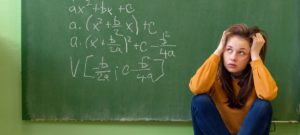Answer to Question #221427 in Differential Equations for Ravi
Let us find the general solution of the ordinary differential equation "(D^2+2D+1)y=e^{-x}\\ln x" using method of variation of parameters. The characteristic equation "k^2+2k+1=0" of the homogeneous differential equation is equivalent to "(k+1)^2=0," and hence has the roots "k_1=k_2=-1." The general solution of the non-homogeneous equation is of the form "y=C_1(x)e^{-x}+C_2(x)xe^{-x}."
Therefore, we should solve the following system
"\\begin{cases}C_1'e^{-x}+C_2'xe^{-x}=0\\\\-C_1'e^{-x}+C_2'e^{-x}-C_2'xe^{-x}=e^{-x}\\ln x\n\\end{cases}"
which is equivalent to
"\\begin{cases}C_1'=-C_2'x\\\\-C_1'+C_2'-C_2'x=\\ln x\n\\end{cases}"
"\\begin{cases}C_1'=-C_2'x\\\\C_2'x+C_2'-C_2'x=\\ln x\n\\end{cases}"
"\\begin{cases}C_1'=-C_2'x\\\\C_2'=\\ln x\n\\end{cases}"
"\\begin{cases}C_1'=-x\\ln x\\\\C_2'=\\ln x\n\\end{cases}"
It follows that
"C_1(x)=-\\int x\\ln xdx="
|"u=\\ln x, dv =xdx, du=\\frac{dx}{x},v=\\frac{x^2}{2}" |
"=-\\frac{1}{2}x^2\\ln x+\\frac{1}{2}\\int xdx"
"=-\\frac{1}{2}x^2\\ln x+\\frac{x^2}{4}+C_1"
"C_2(x)=\\int\\ln xdx="
|"u=\\ln x, dv =dx,du=\\frac{dx}{x}, v=x" |
"=x\\ln x-\\int dx"
"=x\\ln x-x+C_2."
We conclude that the general solution is
"y=(-\\frac{1}{2}x^2\\ln x+\\frac{x^2}{4}+C_1)e^{-x}+(x\\ln x-x+C_2)xe^{-x}" or
"y=(\\frac{1}{2}x^2\\ln x-\\frac{3}{4}x^2+C_1+C_2x)e^{-x}."








Comments
Leave a comment